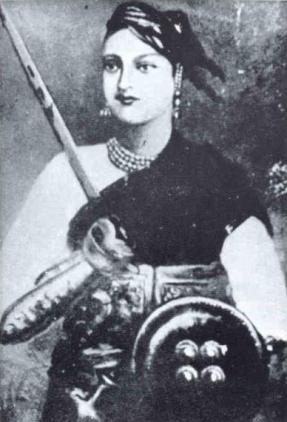 |
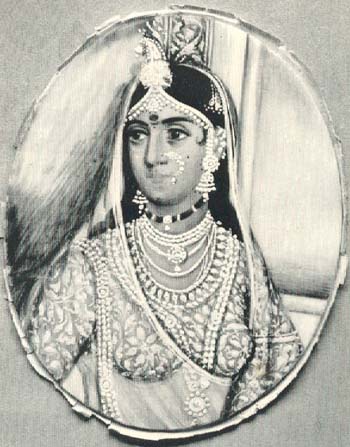 |
 |
 |
|
Jhansi
Ki Rani Lakshmibai Biography
Lakshmibai, The Rani Queen of Jhansi 19 November 1835 – 17 June 1858 known as Jhansi Ki Rani, was the queen of the Maratha-ruled princely state of Jhansi, was one of the leading figures of the Indian Rebellion of 1857, and a symbol of resistance to British rule in India. She has gone down in Indian history as a legendary figure, as India's "Joan of Arc. she was called by the name Manikarnika. Affectionately, her family members called her Manu. At a tender age of four, she lost her mother. As a result, the responsibility of raising her fell upon her father. While pursuing studies, she also took formal training in martial arts, which included horse riding, shooting and fencing. To know the complete life history of Rani Laxmibai of Jhansi, read on
(One of two large cannon on display at Jhansi Fort. This one is the Bhavani Shankar cannon which was operated by Moti Bai.) Rani Jhansi was determined not to give up Jhansi. She strengthened its defences and assembled a volunteer army. Women were also given military training. Rani's forces were joined by warriors including Gulam Gaus Khan, Dost Khan, Khuda Baksh, Lala Bhau Bakshi, Moti Bai, Sunder-Mundar, Kashi Bai, Deewan Raghunath Singh and Deewan Jawahar Singh. 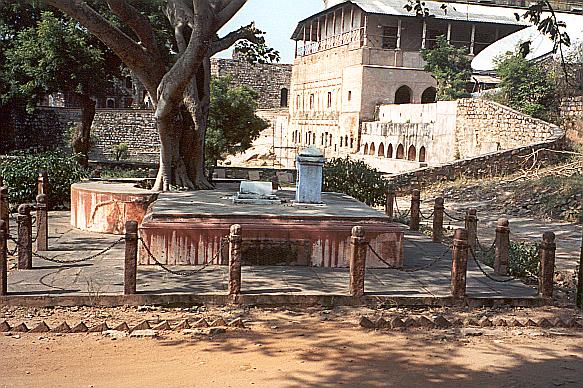
(The memorial to Gulam Gaus Khan, Moti Bai and Khudabaks. The three are remembered together as a symbol of unity. The Panch Mahal is in the right background along with a satellite dish) While this was happening in Jhansi, on May 10, 1857 the Sepoy (soldier) Mutiny of India started in Meerut. This would become the starting point for the rebellion against the British. It began after rumours were put about that the new bullet casings for their Enfield rifles were coated with pork/beef fat, pigs being taboo to Muslims and cows sacred to Hindus and thus forbidden to eat. British commanders insisted on their use and started to discipline anyone who disobeyed. During this rebellion many British civilians, including women, and children were killed by the sepoys. The British wanted to end the rebellion quickly. Meanwhile, unrest began to spread throughout India and in May of 1857, the First War of Indian Independence erupted in numerous pockets across the northern subcontinent. During this chaotic time, the British were forced to focus their attentions elsewhere, and Lakshmi Bai was essentially left to rule Jhansi alone. During this time, her qualities were repeatedly demonstrated as she was able swiftly and efficiently to lead her troops against skirmishes breaking out in Jhansi. Through this leadership Lakshmi Bai was able to keep Jhansi relatively calm and peaceful in the midst of the Empire’s unrest.
Up to this point, she had been hesitant to rebel against the British, and there is still some controversy over her role in the massacre of the British HEIC officials and their wives and children on the 8th June 1857 at Jokhan Bagh. Her hesitation finally ended when British troops arrived under Sir Hugh Rose and laid siege to Jhansi on 23rd March 1858. Rani Jhansi with her faithful warriors decided not to surrender. The fighting continued for about two weeks. Shelling on Jhansi was very fierce. In the Jhansi army women were also carrying ammunition and were supplying food to the soldiers. Rani Lakshmi Bai was very active. She herself was inspecting the defense of the city. She rallied her troops around her and fought fiercely against the British. An army of 20,000, headed by the rebel leader Tatya Tope, was sent to relieve Jhansi and to take Lakshmi Bai to freedom. However, the British, though numbering only 1,540 in the field so as not to break the siege, were better trained and disciplined than the “raw recruits,” and these inexperienced soldiers turned and fled shortly after the British began to attack on the 31st March. Lakshmi Bai’s forces could not hold out and three days later the British were able to breach the city walls and capture the city. Yet Lakshmi Bai escaped over the wall at night and fled from her city, surrounded by her guards, many of whom were from her women’s military. Along with the young Damodar Rao, the Rani decamped to Kalpi along with her forces where she joined other rebel forces, including those of Tatya Tope. The Rani and Tatya Tope moved on to Gwalior, where the combined rebel forces defeated the army of the Maharaja of Gwalior after his armies deserted to the rebel forces. They then occupied the strategic fort at Gwalior. However on the second day of fighting, on 18 June 1858, the Rani died. 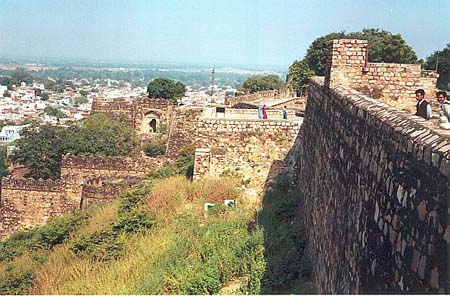
(The so-called Jumping Point. The Rani is claimed to have jumped her horse from this point on the wall to the ground below and so make her escape. The figures in red and blue give an idea of the scale. This plus the rough and sloping ground below must surely mean that any horse would have been killed, not to mention the rider. The Rani was a good rider, but physics is physics. It is somewhat more likely that she left by the gate.) She died on 18 June, 1858 during the battle for Gwalior with 8th Hussars that took place in Kotah-Ki-Serai near Phool Bagh area of Gwalior. She donned warrior's clothes and rode into battle to save Gwalior Fort, about 120 miles west of Lucknow in what is now the state of Uttar Pradesh. The British captured Gwalior three days later. In the report of the battle for Gwalior, General Sir Hugh Rose commented that the rani "remarkable for her beauty, cleverness and perseverance" had been "the most dangerous of all the rebel leaders".
|
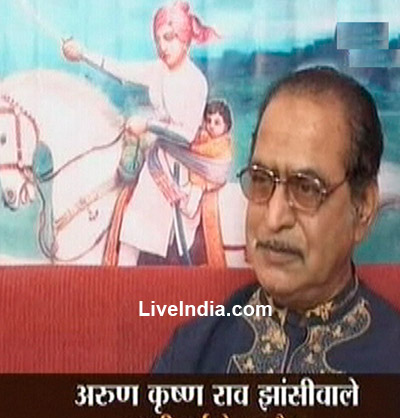
Arun Krishnarao G.Grandson of Jhansi ki Rani Lakshmibai |
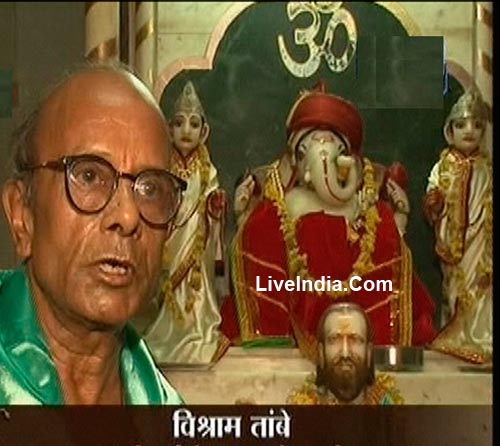
Vishram Tambe G.Grandson of uncle of Jhansi ki Rani Lakshmibai Ganesh temple, Laxmi Bai married here with Gangadhar Rao |
|
||||
 |
 |
 |
|

Priyanka Chopra |

Ranbir Kapoo |

Katrina Kaif |

Salman Khan |

Aishwarya Rai |
| Priyanka Chopra | Harman Baweja | Ranbir Kapoor | Deepika Padukone | Salman khan | Aishwarya Rai | Amitabh |
| Female models | Fashion, Models | Miss World | Miss Universe | Valentine's Day | Greeting Cards | Art Gallery |
| ~~Goa | Taj Mahal | Rajasthan | Kashmir | Leh Ladakh | Lakshadweep | Kerala |
| Kailash Mansarover | Amarnath | Sai Baba | Maa Vaishno Devi | Maa Ganges | Old New Delhi | Live Earth |
| Live World Tours | December 21, 2012 | Nostradamus | Horoscope | Year Horoscope | Freedom Fighters | Current News |
| Indian Cricket | I P L Cricket | Hotels in India | World Universities | Indian Herbs | Pencil Shading | Computers Career |
| YOGA -- Latest | Body Building | Nutritious Food | Meditation | From Rajesh Chopra | Press Information | Designing & Hostin |
| Privacy Policy for LiveIndia.Com |
|
|